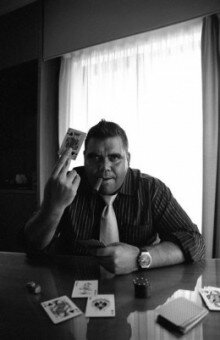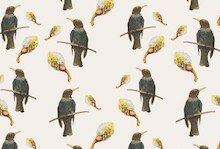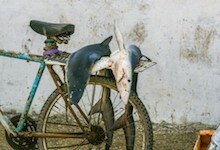
Born in Brisbane in 1972, Samuel Wagan Watson is of Munanjali, Birri Gubba, German, Dutch and Irish descent. He spent much of his childhood on the Sunshine Coast before returning to Brisbane to start a career. He was the winner of the 1999 David Unaipon award for emerging Indigenous writers with his first collection of poetry, Of Muse, Meandering and Midnight. Since then he has written four more collections; Itinerant Blues (2001), Hotel Bone (2001), Smoke Encrypted Whispers (2004), which won the 2005 New South Wales Premier’s Book of the Year and the Kenneth Slessor Poetry Prize, and The Curse Words (2011).
“I don’t see myself as an ‘Australian’ poet until I’m actually performing outside of Australia,” writes Watson. “It’s an odd way to exist. I’ve shared a podium with some fantastic ‘Australian’ poets and I understand their position. I’ll never be a Les Murray. I’ll never be as dedicated to the form as Dorothy Porter – but it was a pleasure to work alongside those artists! I’m more comfortable being a Brisbane writer. The muddy swell of the tides has been a good muse!”
Charles Bukowski seems a constant in much of Watson’s poetry, alongside the ethos of the Beats (Watson notes in an interview he keeps a copy of Kerouac’s On the Road close to hand) reworked to the contemporary Australia’s landscape and language. ‘Gas Tank Sonnets’ is one example:
GAS TANK SONNETS
1 hour out of Byron Bay
and no dreams for three days
when the snakes in the engine
hatched a mutiny
the radiator hose was the first to go
a roadside heart-attack,
meatball surgery with a swiss-army knife
and almost hijacked by hitchers
the days and days of service station pies
finally ripped through my spare tyre
and cocktails of on-edge nerves did their work
while all the time
across the hills, the Pacific
looking good enough to eat
feelings of withdrawal
leaving
Byron Bay and the muse,
for the likes of Brisbane-town
and this want of becoming a writer
tongue dragging along the bitumen
regurgitating yesterday's gravel,
the mind aflush
with gas tank sonnets
Throughout his work, Watson’s humour is never far off. Here, the days measured in “service station pies” might be a wink to Prufrock or more simply an example of the precision in detail and observation his poetry is often praised for. The final Looney Tunes working of his writerly ambition, hilarious as it is beautiful, his “tongue dragging along the bitumen/ regurgitating yesterday’s gravel,/ the mind aflush/ with gas tank sonnets” calls to mind another of Watson’s heroes, Hunter S. Thompson – perhaps it’s no coincidence that the Brisbane he is escaping also goes under the moniker of Brisvegas – as well as a young Kerouac or Robert Adamson (not least in his early poem ‘The Imitator’).
Though he sings the praises of his muse Brisbane, he doesn’t simply play out or against Romantic tropes: as he notes, the Brisbane River’s waters are muddy. Watson’s passion and openhearted dissection of “yesterday’s gravel” creates a lyrically intense experience coupled with subtle and ingenious tamperings with the symbolic. The lived-in quality of the poems, the lyrical details of an itinerant life, its gambles and gambols, rooming houses, bloodied noses, the self-conscious and unapologetic claim of it all as part of the writer’s due and lot, and the hard-won experience carved from it, make him a fitting successor to Bukowski. But his work and its importance only begins there, vested as it is in contemporary Australian politics.
Watson’s gonzo and Beat passions, far from risking criticisms of being derivative or outmoded, work perfectly as a bludgeon, vehicle and song of dissent against the contemporary Australian ugliness: intransigent racism, hypocrisy and criminal smallness (of mind, heart and, if you believe in such things, soul) that guides contemporary Australian discourse and politics about asylum seekers and indigenous issues. Yet Watson does not give into rancour; his heart and humour are too large and sharp for that. Poems such as ‘White Stucco Dreaming’ and ‘Hotel Bone’, among so much of Watson’s work, argue and sing through the layers of bullshit levelled out by both sides of politics in the name of economics and security. Watson humanises the complexity of the lives being governed and offers the reality of community created on the margins, raising with humour the “voodoo of semantics” against the “cappuccino song” of middle Australia’s retrograde conformism as well as against the populist dog-whistle politics embraced by both sides of Australian politics in the decade since the Tampa affair:
HOTEL BONE
the street resembles a neck
from a wayward guitar
with Hotel Bone sitting idle on a vein,
wedged between two frets
where the bad tunes can reach her
these white stucco walls, I imagine, once carried a vision of pearl
now a gourd for asylum seekers
Iraqi, Indonesian, Sri Lankan
and one crazy Aboriginal . . . who lives with a typewriter
but not with the brevity of a visa on my head, no,
my longevity was guaranteed before I was born
in the 1967 referendum
the freedom to practice the voodoo of semantics
within the marrow of Hotel Bone
existence only 2 minutes walk
from some of the best latte lounges in the city
yet white faces don't come down here
until they've been classified unfit for duty
no longer permitted upon the chorus line
of the cappuccino song
where multi-culturalism is in an airline format
first-class, business and economy seating
but those of us who submit to the chance of mystery-flights
end up on the tar of Hotel Bone
a haven from Saddam, Suharto, the Tamil Tigers
and One Nation
this Hotel Bone;
it is hard
it is reachable
it is home
Early on, Anita Heiss wrote in a review of Watson’s multi-award-winning collection Smoke Encrypted Whispers:
Much Indigenous poetry is written and indeed read because of what it has to say (rather than how it is written), because it provides the political voice that Indigenous people are denied in other areas of Australian society. Watson’s writing is different, though. He has mastered the craft of writing and also says what he needs to say as a blackfella. He is not guilty of what he charges other writers with in ‘Author’s notes #2’. Some writers never cross beyond the second or third dimension of a page.
Watson’s insights and anecdotes are personal, almost voyeuristic to the reader, his topics universal and accessible, and his language is deliciously seductive.
Seductive and, like any good seduction, perhaps, a little unsettling of the received positions unwittingly accepted as the norm and sufficient. Watson’s poetry embraces the complexity of contemporary Australian discourse and identity, which, reduced and stupified by the Howard years, seems little improved by the Gillard year. Alongside poets such as Ali Cobby Eckermann and Lionel Fogarty, Watson is one of the key voices in the reassertion and resurgence of contemporary indigenous Australian poetry. That said, Watson speaks for a broad cross-section of contemporary Australian experience, traversing and speaking to the faultlines that make a rich country like Australia such a troubling and troubled place.
Watson has said, “I suppose I look at all of these poems I’ve written as like they’re the Polaroids, come out of my head, through my eyes and I’m taking photos.” That combination of instantaneity and singularity (perfected posthumously by the Polaroid in the digital age) is a good analogy for his work. His writing reframes lived experience often by embracing its headlong moment and momentum, while offering in the re-reading the chance glance captured and relived, details that might have been overlooked, connections that should be apparent. Through these he offers the vital signs of Australian society and community, showing that they are far from being one and the same thing.
Watson has toured overseas and held residencies on the Australian Broadcasting Commission TV’s Sunday Arts Show, in Indonesia during the Utan Kayu Literary Biennale and in the community of Yarrabah in North Queensland. His poetry has been translated into German, Norwegian and Bahasa Indonesia. Watson’s opera die dunkle Erde (The Dark Earth) premiered in Brisbane in 2004 and again in 2005 for the Brisbane Music Festival. It is the story of a German vampire who gets a taste for Aboriginal Dreaming. His poetry has been adapted into animation with the support of the Australian Film Commission and a short documentary by Brisbane fimmaker Helen Kassila, entitled ‘Bound in Bitumen’, has won acclaim within the arts-festival circuit. In 2010 he received the National Mental Health Award in Media Awards for his work as a writer/script developer for 98.9FM Murri Country radio and for “educating wider audiences on the plight of Indigenous Australians living with mental illness”.
Bibliography
Poetry
Of Muse, Meandering and Midnight, University of Queensland Press, Brisbane, 1999
Hotel Bone, Vagabond Press, 2001
Itinerant Blues, University of Queensland Press, Brisbane, 2002
Smoke Encrypted Whispers, University of Queensland Press, Brisbane, 2004
Three legged dogs, and other poems, Picaro Press, Eleebana, NSW, 2005
The Curse Words, Vagabond Press, 2011
Work in translation
Bla Beveglelse (Itinerant Blues); Norwegian translation by Anders Sovik, 2005
Links
Samuel Wagan Watson at the Sydney Writers Festival talking about his influences on Slow TV
Samuel Wagan Watson discussing his work on the Wordshed, and reading ‘The Crooked Men’
Samuel Wagan Watson’s response to the 2008 Apology
‘On the road’: Samuel Wagan Watson and Martin Harrison on Poetica
Anita Heiss reviews Smoke Encrypted Whispers for Australian Humanities Review
Steve Austin and Hilary Beaton review Smoke Encrypted Whispers on ABC Queensland







